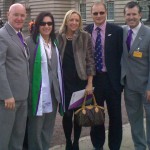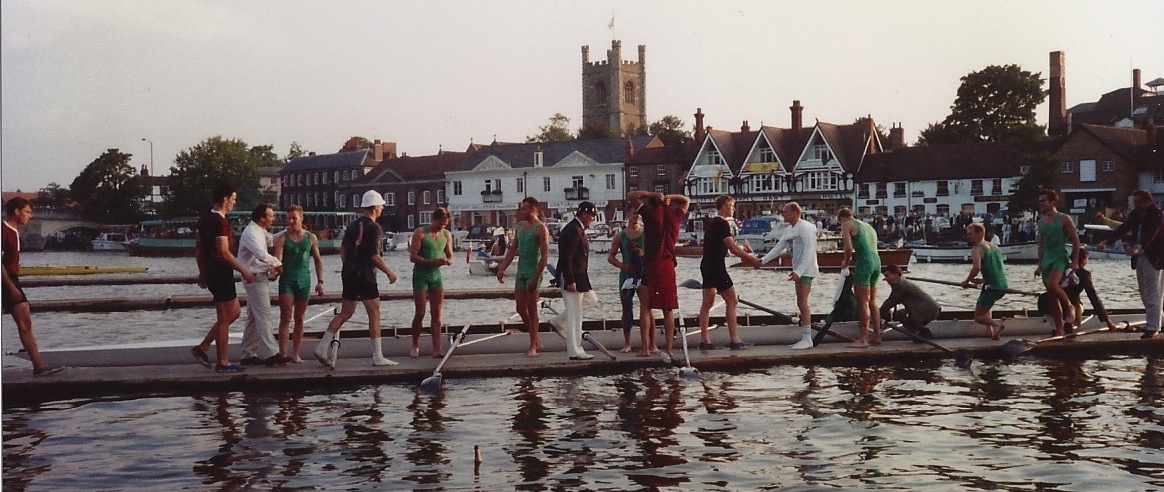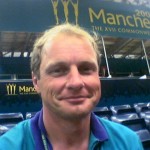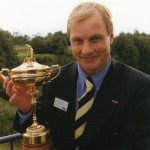In 2001, I took a sabbatical from my career in corporate communications in the mobile phone industry to work on XVII Commonwealth Games in Manchester. With experience in public relations and sponsorship management, I joined the small team that was to stage the Queen’s Baton Relay – the Commonwealth Games’ equivalent of the Olympic Torch Relay.
The Queen’s Baton Relay has been a feature of the “friendly games” since Cardiff in 1958. The Baton contains a message from the Queen, in her capacity as Head of the Commonwealth, inviting athletes to meet and compete at the forthcoming Games. Just as the Commonwealth Games live in the shadow of the Olympics, so the Baton Relay doesn’t enjoy the awareness of the Torch Relay.
Having witnessed how the Olympic Torch Relay had brought the whole of Australia behind Sydney 2000, the Manchester 2002 organising committee elevated their ambitions for their own Baton Relay. As 2002 would also be the Queen’s Golden Jubilee, the Relay was seen as an opportunity to link two great events in a national celebration: the 2002 Baton Relay became the Queen’s Jubilee Baton Relay.
Towards the end of 2000, a core team of Sydney veterans was drafted in to raise the Baton Relay to new heights. I joined in September 2001 and became one of the senior Brits on the team. After becoming the first sporting Relay to circle the world – and visiting 23 countries en-route – the Baton arrived back in Britain on 6 June 2002. The Relay, and I, traveled 5000 miles across the British Isles, passing through 500 towns and cities in 50 days and visiting many famous sporting venues, before arriving at the City of Manchester Stadium for the Opening Ceremony on 25 July.
After the Games, I returned to the mobile industry and moved south to St Albans where I was surprised to learn that the city better known as the site of Britain’s first Christian martyrdom was also the birthplace of a major international sporting institution – golf’s Ryder Cup. Sam Ryder was a late-Victorian entrepreneur who came to St Albans with a plan to revolutionise seed retailing. He succeeded and made a fortune. Taking up golf quite late in life, he became a major benefactor to professional golf before conceiving the trans-atlantic team competition and donating the cup.
He also contributed a couple of prominent buildings to the St Albans city-scape. I didn’t realise it at the time, but when the Queen’s Jubilee Baton Relay had visited St Albans, it passed in front of Ryder’s former headquarters and exhibition hall. Sadly, that sporting connection had been overlooked. In many ways, it wasn’t really surprising as neither building has any external acknowledgement of their sporting connections – although they do get a passing reference in some excellent guided walks. This prompted me to wonder how many other places that are strongly linked with the history of sport have been forgotten and need to be rediscovered.
So, I started to dig. And as I do so, I’m learning more about Britain’s sporting history – including the typically British tensions, prejudices and sporting apartheid that arose during the Victorian era between the aristocratic, landed classes who could afford to be “amateurs” and the working classes with less leisure time and disposable income.
To date, I’ve identified more than 400 locations that have an interesting sporting connection. This blog will allow me to share the journey with other sports enthusiasts as I research them in greater depth. More importantly, it will allow others to share their own favourite long-forgotten local sporting landmarks.
I also thought that as the focus of the sporting world turned to London 2012, it would be good to remind ourselves that Britain’s sporting heritage is not confined to the M25! There’s a whole new tourism opportunity here!
One SportingLandmark I became aware of shortly after the Baton Relay was the birthplace of the author of the Queensberry Rules for boxing in, of all unexpected settings, Llanelli. In reading more widely about sporting history the name John Graham Chambers crops up surprisingly often in relation to a variety of sports. Since 2015, I’ve been trying to tie-up the various strands of his story, as nobody appears to have tried before. This obsession has diverted attention from the core purpose of this blog which is a poor excuse for the decline in the frequency of posting.
As for me, I’ve been mad about sport since I was a small boy. Although I was born and brought up in south Wales, I’ve supported Leeds United all my life: both my parents grew up in Leeds and Dad’s mum lived a short walk from Elland Road. Football was played continuously through every break at junior school and during the first three years at secondary school, where I was also enthusiastic, if not the most talented, at rugby, cricket and gymnastics.
Since my teens, my sporting career has been dominated by rowing: I’ve been an oarsman and regatta organiser for more than thirty years. Perhaps my biggest – though not very big – claim to fame was that I represented Wales as a junior at the 1978 home international regatta. A certain Steve Redgrave won his first junior international vest – for England – at the same event. Our rowing careers diverged from that point on! Being a volunteer at two World Rowing Championships – 1986 in Nottingham and in the media team at Eton in 2006 – were also great experiences.
I’ve also played club rugby (in Belgium), represented Great Britain at Dragon Boat Racing in Hong Kong, completed several marathons and half marathons and even survived the Lanzarote Ironman triathlon. As a golfer, on a good day, I just about qualify as a hacker!
My working life has embraced corporate communications, public relations, event management and marketing. I’ve had the privilege of working behind the scenes in professional sport having handled sponsorship programmes involving the Football Association, Everton Football Club, Rotherham United FC and the British Masters golf tournament. I also work with IBC, one of the world’s biggest broadcast technology conference and exhibitions, which invariably puts sport in the spotlight given its importance to the television industry. Occasional freelance writing commissions have included a number of articles on the importance of sports content in new media.
As a spectator, my most memorable sporting experience was probably seeing Seb Coe break the world record for the mile in Brussels in 1981: it was also an occasion when the description “electric atmosphere” was totally appropriate. It also exemplified why sport is so special.
Update

I caught up with some of my Manchester 2002 Queen’s Jubilee Baton Relay colleagues at the start of the Delhi 2010 Queen’s Baton Relay at Buckingham Palace on 29 October 2009. Between them, Steve, Annemaree and Adam (in the grey suits) have worked on the Relays for Sydney 2000, Manchester 2002, Doha 2006, Melbourne 2006, Beijing 2008, Delhi 2012, London 2012, Sochi 2014 and Gold Coast 2018.
Ian Volans





